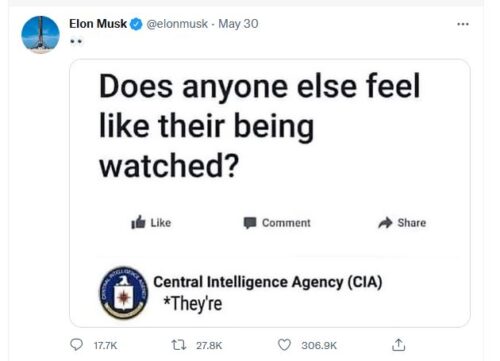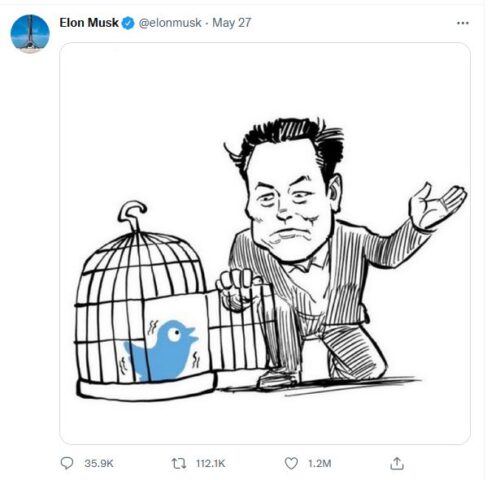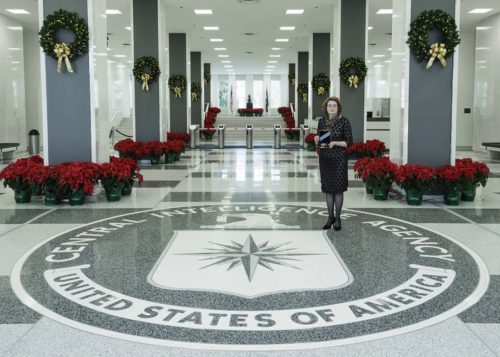
Spying on Elon Musk?
Elon Musk hardly needs an introduction these days, but here goes. He’s the richest man in the world, has a droll sense of humor, is a naturalized US citizen (born in South Africa) and has 7 children.
Founder of blazing-into-the-future companies Tesla and SpaceX, on 30 May Musk tweeted he felt as if he was being watched, and cleverly implied that the Central Intelligence Agency was responsible.

Twitter Related?
Musk’s plans to buy Twitter have sparked a huge online controversy. To quote CNN, Musk believes Twitter should be a “digital town square that abides by free-speech principles. Musk’s main critique about Twitter today is that it is too restrictive. Under his ownership, Musk has suggested, Twitter would treat content more permissively, pivoting away from content removals and account bans. He has also proposed opening up Twitter’s algorithm to public review so that, in theory, users could understand how it makes decisions . . . a kind of referendum on the future of online speech.” https://www.cnn.com/2022/04/26/tech/importance-of-musk-buying-twitter/index.html

The possible purchase has become highly politicized, fueled in part by the Biden administration’s announcement of a Disinformation Governance Board mere days after Musk’s bid to buy Twitter. Hardly a coincidence and gasoline on the already raging online fire, the Board was shuttered after only 3 weeks amid discussion of its legality. https://www.forbes.com/sites/jillgoldenziel/2022/05/18/the-disinformation-governance-board-is-dead-heres-the-right-way-to-fight-disinformation/
FYI: Personally I think Twitter has become a toxic stew. I maintain an account but am rarely on the platform.
The CIA angle
As a 30-year veteran of the CIA, and occasional talking head about the Agency, I’m concerned about the notion of the CIA “watching” a US citizen, especially if this has anything to do with the current presidential administration’s obvious opposition to Musk’s Twitter purchase.
The Agency’s legal mandate expressly forbids it from participation in US policy or targeting Americans. The latter responsibility belongs to the Federal Bureau of Investigation.
Codified in the National Security Act of 1947, the Agency’s mission is no secret.
“To stop threats before they happen and further U.S. national security objectives, we:
- Collect foreign intelligence;
- Produce objective analysis; and
- Conduct covert action, as directed by the president.
We do not make policy or policy recommendations. Instead, our Agency serves as an independent source of information for people who do. We are not a law enforcement organization.”
Related: My CIA Career: Glutinous but not Unflavorful
Two Rules
When I joined the CIA as an all-source foreign intelligence analyst during the second Reagan administration, it was drummed into our heads that analysis was independent of policy. Over and over, we were warned about “clientelitis:” massaging intelligence analysis conclusions to align with the views of the client, i.e. the policymaker it was intended for. Just like the CIA website says: an independent source of information for people who do.
Related: Inside my CIA Career: The Analytic Puzzle

With my Career Intelligence Medal on the Great Seal, shortly before Christmas 2016
Later, as an intelligence collector, the legal structure ensuing that collection stayed true to the CIA’s foreign intelligence mission was inviolable. Specifically targeting an American citizen was unthinkable and there were multiple layers of oversight to ensure it did not happen. Were there lapses? Not on my watch, not in offices I managed.
If either of these two guiding rules at the CIA are no longer enforced, there is trouble ahead.
Carmen Amato is the author of the Detective Emilia Cruz police series set in Acapulco and the upcoming Galliano Club historical thrillers. A 30-year veteran of the Central Intelligence Agency, her personal experiences occasionally make their way into her fiction.
Want to know more? Follow me on Facebook or get Mystery Ahead updates in your email inbox every other Sunday.



